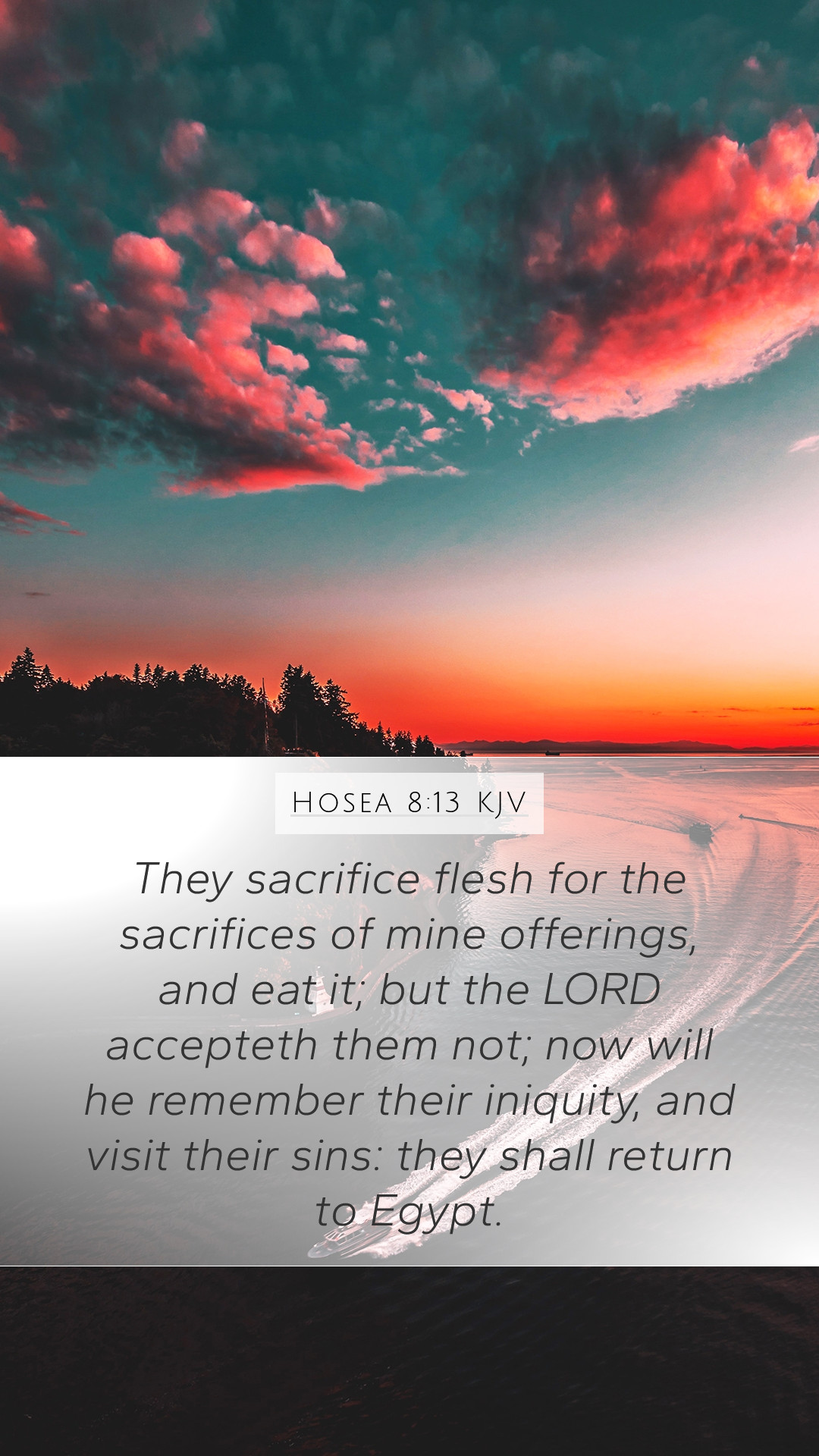Old Testament
Genesis Exodus Leviticus Numbers Deuteronomy Joshua Judges Ruth 1 Samuel 2 Samuel 1 Kings 2 Kings 1 Chronicles 2 Chronicles Ezra Nehemiah Esther Job Psalms Proverbs Ecclesiastes Song of Solomon Isaiah Jeremiah Lamentations Ezekiel Daniel Hosea Joel Amos Obadiah Jonah Micah Nahum Habakkuk Zephaniah Haggai Zechariah MalachiHosea 8:13 Meaning
What is the meaning of Hosea 8:13?
They sacrifice flesh for the sacrifices of mine offerings, and eat it; but the LORD accepteth them not; now will he remember their iniquity, and visit their sins: they shall return to Egypt.
Hosea 8:13 Bible Verse Meaning
Bible Verse Meaning and Commentary on Hosea 8:13
Scripture Reference: Hosea 8:13 - "They sacrifice flesh for the sacrifices of mine offerings, and eat it; but the Lord accepteth them not; now will he remember their iniquity, and visit their sins: they shall return to Egypt."
Overview of Hosea 8:13
This verse is set against the backdrop of Israel's unfaithfulness to God, primarily focusing on their misguided worship practices. Despite their sacrifices, God rejects their offerings due to their persistent sin and idolatry.
Commentary Insights
-
Matthew Henry:
Henry emphasizes that although the people slaughtered animals for sacrifices, their sinful hearts invalidated these acts. He notes God’s rejection of their sacrifices signifies a deeper issue of the heart, pointing out that mere external religious practices do not impress God when one does not have a sincere heart.
-
Albert Barnes:
Barnes interprets the sacrifices here as a perverse substitute for true worship, highlighting that the actions of the Israelites were at odds with the essence of devotion to God. He explains that although they had the form of worship, they lacked the spirit, which is utterly unacceptable to God.
-
Adam Clarke:
Clarke adds that returning to Egypt signifies Israel's impending captivity and their recognition of the futility of their rebellion. He points out that this verse serves as a stark warning of the consequences of their actions—spiritual emptiness and eventual judgment.
Understanding the Significance of Hosea 8:13
The meaning of this verse extends beyond its immediate context to touch upon key themes in biblical theology:
- Rejection of False Worship: This verse serves as a reminder that God seeks those who worship in spirit and truth (John 4:24). The ineffectiveness of sacrifices reflects God's desire for genuine communion rather than robotic ritualism.
- The Weight of Iniquity: The latter part of the verse serves as a sober reminder that God will remember the sins of the people, leading to judgment. This highlights the principle that spiritual and moral accountability carries consequences (Galatians 6:7).
- Return to Bondage: The allusion to returning to Egypt symbolizes a regression to spiritual slavery, contrasting their current state of supposed autonomy from God with the reality of their disobedience, which leads back to bondage (Jeremiah 32:30).
Application of the Verse to Daily Life
Understanding Scripture can often illuminate our own practices and beliefs. In reflecting on Hosea 8:13, believers today might consider the following applications:
- Examine Motives: It is crucial to evaluate the motives behind one’s worship. Are our acts of devotion sincere and directed towards God, or are they mere traditions devoid of heart?
- Accountability for Actions: This verse reminds us of the importance of recognizing and confessing our iniquities before God, understanding that moral choices have eternal ramifications.
- Strive for Authenticity: Engage in practices that reflect a genuine relationship with God, prioritizing heart transformation over mere ritualistic observance.
Related Cross References
- Isaiah 1:11-15 - God’s rejection of empty worship.
- Amos 5:21-24 - The futility of offerings without justice.
- Micah 6:6-8 - The essence of true worship as justice, mercy, and humility.
Conclusion
Hosea 8:13 serves as a stark reminder about the nature of acceptable worship and our personal accountability to God. By seeking Bible verse interpretations and insights, readers can grow in both understanding and application of Scripture.


